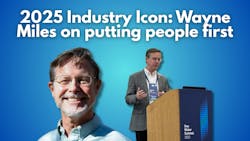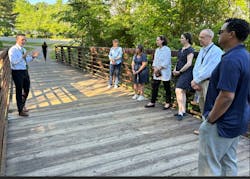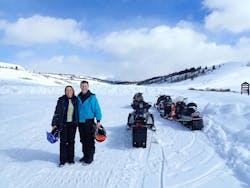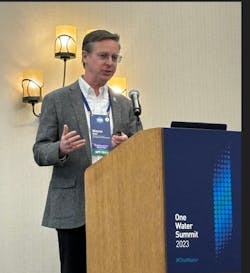2025 Industry Icon: Wayne Miles on putting people first
For Wayne Miles, the stormwater industry is about the people.
As a self-proclaimed introvert, making this statement is a surprise to himself, but it is not so surprising for those who work with him.
Scott Bryant, stormwater business and financial operations manager for Raleigh Stormwater, said Miles is a champion of the staff. Bryant said Miles has an attitude that to best serve the community, the staff has to serve each other first.
Ariel Bushel, communications analyst for Raleigh Stormwater, said Miles taught her never to think that what she believes is invalid.
“I am not a manager currently, but if I were ever to be one at some point in time, I definitely would model the way that I manage and work with staff the way that he does because I think he has a good balance of wanting things to be done but also understanding that people are people,” she said.
For these reasons, and many others, Miles, assistant director and stormwater program manager in engineering services for Raleigh Stormwater, is the 2025 Stormwater Solutions industry icon.
A full-circle career path
While at the University of Florida, Miles quickly felt pulled toward environmental engineering. Following graduation, he began a career with CDM Smith, where he worked for 30 years before joining Raleigh Stormwater.
While at CDM Smith, Miles was doing a variety of wet weather management projects as a consultant. There, he was exposed to early modeling skills. Over the years, his roles included applying hydraulic models, analyzing stormwater and sanitary sewer systems that had wet weather issues and collaborating on community projects dealing with aging infrastructure, infiltration, inflow remediation and sanity sewer overflow mitigation.
Miles said that in the 90s and early 2000s the United States Environmental Protection Agency (EPA) was taking a lot of action, and a lot of consent decrees were being issued, causing his work to really take off. His role evolved into project management as he helped communities meet said consent decree requirements.
As he approached his 30th anniversary with the company, he experienced a medical event that caused him to reflect. As he recovered, he saw a job advertisement to be the stormwater manager of Raleigh, North Carolina. He made the decision to apply for the role and leave CDM Smith. He has now been with Raleigh for seven years.
Taking on this role brought his career full circle. While at CDM Smith, Miles was a stormwater engineering consultant for the city as it was building its stormwater utility program. The city wanted to transform its stormwater program from being funded by a general city fund where it was competing against other departments, such as fire and police, to instead have a dedicated revenue-source using an impervious surface-based stormwater utility fee. The notion passed through city council by one vote.
“As a consultant, I saw good programs and bad programs, everything in between,” Miles said. “Good leaders, bad leaders, everything in between. So, I really think that helped me prepare myself to do what I needed to do here at the city of Raleigh.”
Now, as the stormwater program manager for Raleigh, he can bring even more of those ideas he had as a consultant to the table.
Community-first approach
When Miles reflects on his career, he said he is most proud of what he has been able to do in the city of Raleigh.
“I believe we really help the community be more resilient,” he said of the stormwater team. “You know, we very much look at public safety here at Raleigh.”
He points to western North Carolina, where Hurricane Helene caused a lot of devastation in 2024, as an example of why building resilience is key.
“It really puts into perspective why we need to continue getting better prepared,” he said. “You can never be prepared for an event like that, but we can be better prepared. We can keep working on getting the community prepared, and getting our systems prepared. A lot of it is just awareness of the community of what to do, what not do, how to be prepared, what the potential impacts can be ... .”
Industry Involvement
- APWA North Carolina Chapter
- City Parks Alliance
- Presented on Raleigh’s advancement of GSI
- Southeast Stormwater Association
- Water Equity Network — U.S. Water Alliance
- Water Environment Federation
As for concrete examples of making his community more resilient, Miles points to a few. One being a flood early warning system and predictive modeling based on forecasts up to three days in advance, which helps the community be better prepared and informed. In another instance, Miles and his team worked on tightening floodplain development regulations in the city. A new policy removed the ability to continue building in the floodplain, and there is now a citywide green stormwater infrastructure policy, so anytime a project is considered a land-disturbing development, GSI elements must be considered for implementation.
“That’s just changed the mindset of really the city and the community,” he said. “We’re leading by example, and the community sees that. And they’re demanding that more from not only city development, but private development as well.”
Bushel finds that Miles always makes himself present — both internally and externally. She said he usually makes appearances at public meetings and is always willing to speak with residents and answer their questions.
“He’s just a really strong champion of putting our public engagement first and making sure that we are providing accurate information but also equitably reaching out to the community to make sure that they are getting all of the information that we have,” Bushel said.
Embracing a team-first mindset
When he thinks locally, Miles calls his Raleigh team wonderful with a focus on environmental awareness, resilience and sustainability.
"I think we’ve got a really good message I think, in terms of an employer,” he said. “We draw people to come work in our program who really want to make a difference with the community.”
On Fridays, Miles leads his team in a weekly progress report he calls the Hit and Misses Report, also known as the HAMR report. Bryant said the team has more hits than misses, but even the misses provide a learning opportunity.
“His way of support for us on the staff, it really stands out,” Bryant said.
Zooming out, Miles has been heavily involved in industry organizations that have shaped his career. From early in his career to now, he has found this a good avenue for sharing ideas, sparking new ideas and collaborating with other municipalities and stormwater programs.
In fact, some of his first involvement was with the North Carolina joint organization of AWWA and WEA where he created the sewer collection system committee. Then, he became involved with the National Wastewater Collection System Committee and authored a few of their manuals of practice related to wastewater collection and design standards for sanitary sewer programs.
“It’s an opportunity to learn from others and to network and to share what we’re doing at the same time,” he said.
On the horizon
While there is no date on the calendar, Miles said his career is coming nearer to its end. So, with that in mind, he is focused on making Raleigh’s stormwater programs and community more resilient. He and his team have been creating a system that documents all their decisions and processes for legacy knowledge.
He also is focused on creating a culture and legacy of open-mindedness and collaboration. For example, through the City Parks Alliance, the stormwater team and the parks department work together on implementing green stormwater infrastructure and stream restoration projects in local parks. Miles calls it a natural fit that leads itself to community education. Parks see a lot of visitors, so Miles’ team has put up explanations and signage about what the GSI elements are. Plus, local artists help them create these designs, so it is a true community effort.
When he reflects on his career, he calls himself lucky for having so many wonderful mentors, and he tries to pass that on.
“I try to do everything I can to return the favor to others earlier in their career that I get to work with,” he said. “Spend the time to teach, to help them understand the whys of decisions, so that they can become better decisionmakers themselves and help them with the other skills that are so important and oftentimes don’t come naturally to engineers, like the community engagement and the communications and policy aspect.”
About the Author
Katie Johns
Katie Johns, editor-in-chief of Stormwater Solutions, graduated from the University of Missouri in 2016 with a Bachelor of Journalism and a Bachelor of Arts in Spanish. Johns joined the Stormwater Solutions team in September 2019. Johns also helps plan the annual StormCon conference and co-hosts the Talking Under Water podcast. Prior to entering the B2B industry, she worked as a newspaper reporter and editor in Sarasota, Florida, and a magazine assistant editor in the Chicago suburbs. She can be reached at [email protected].






